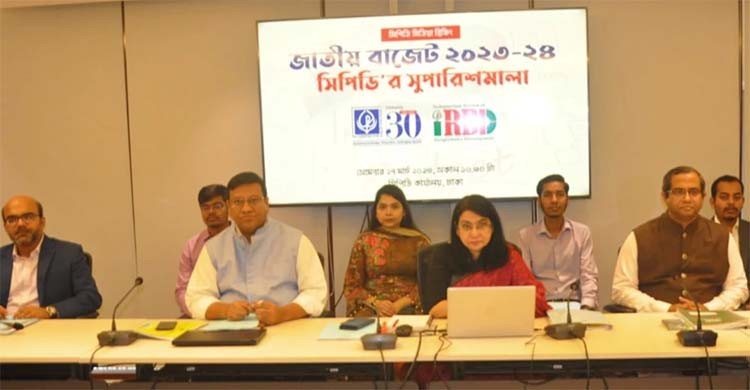CPD bats for special increment for inflation-hit public/private employees in next national budget
27 March 2023, 06:40 pm | Updated: 06 April 2025, 01:18 pm

The Centre for Policy Dialogue (CPD), a think- tank, on Monday urged the government to provide in the next national budget a special increment to both public and private employees to adjust with the inflation.
The increment will help them reduce the stress on maintaining a family’s monthly expenditures which have increased by 25 percent due to depreciated domestic currency, energy and electricity price hikes, the CPD said in its proposals for FY 2023-2024 budget, reports UNB.
Referring to the cost of living the CPD said "Currently, a family of four in Dhaka city has a monthly food expenditures of Tk7,131 without fish and meat or compromise diet, while a regular diet with fish and meat costs Tk22,664."
Considering this situation, the CPD recommended for a 5 percent salary increment of workers in industries, as well as forming a new wage structure.
Fahmida Khatun, executive director of CDP, read out the budget proposals for the fiscal year 2023-24, at press conference at Dhanmondi, in the capital on Monday.
She said the price inflation of essential food products has increased by more than 25 percent which cannot be understood using just the average price inflation data published by the government.
“The price of sugar in Bangladesh was higher than that of the US market. Rice prices in the country were higher than in Vietnam and Thailand, although Bangladesh is self-sufficient in food and imports a small amount of rice,” Fahmida pointed out.
Facing the challenges of slow recovery of the economy from Covid-19 impact and blow of Russia-Ukraine war, the CPD suggested the government emphasises the need to address the serious stress in Bangladesh’s economy in the upcoming budget.
Dr Fahmida said this has accentuated the macroeconomic situation of the country and has drawn attention away from the accumulated and embedded weaknesses within the Bangladesh economy.
She also highlighted several disquieting developments, including negative growth in revenue mobilisation, slow implementation of the development projects, increased reliance on bank borrowing for deficit financing, skyrocketing prices of essentials, declining liquidity situation of banks, deteriorating external sector balance, and the state foreign exchange reserves.
The policymakers' scope of manoeuvring policy measures has become rather limited due to the declining fiscal space, Fahmida said.
Considering the global and domestic situation the think-tank suggested targeted fiscal measures take centre stage, focusing on catering to the needs of the fixed-income earning and low-income population. Such measures should be accompanied by monetary measures that focus on stability, such as market-based interest rates and exchange rates.
The think-tank also emphasised that good governance and discipline are essential for these policies to bring forth their intended results.
It also said that the reform measures proposed by the International Monetary Fund (IMF) might prove to be beneficial in this regard.
The CPD also noted that while the current scenario may be unpopular for a political government in an election year, proper acknowledgement of the current situation should be at the head while formulating the budget for the next fiscal year.
Failure to do so will result in a macro-fiscal policy stance that does not meet the needs of the time, said CPD in the proposals.






















